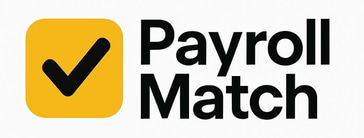Is Your HCM Vendor Still the Right Fit? Insights on Staying Ahead in a Consolidating Market
In the ever-evolving world of human capital management (HCM), staying ahead of the curve is crucial, especially for mid-market companies navigating a landscape marked by consolidation. As HR and finance leaders ponder whether their current HCM vendor still meets their needs, understanding the implications of these industry shifts becomes essential. This post unpacks the latest M&A activity in HR tech, offering insights on how to future-proof your HCM investment amidst these dynamic changes.
Payroll Match
5/2/20254 min read


In the ever-evolving world of human capital management (HCM), staying ahead of the curve is crucial, especially for mid-market companies navigating a landscape marked by consolidation. Recent mergers and acquisitions, such as Paycor's acquisition of Talenya and iSolved's expansion into talent modules, have reshaped the playing field, presenting both challenges and opportunities for discerning buyers. As HR and finance leaders ponder whether their current HCM vendor still meets their needs, understanding the implications of these industry shifts becomes essential. This post unpacks the latest M&A activity in HR tech, offering insights on how to future-proof your HCM investment amidst these dynamic changes. Ready to ensure your vendor choice aligns with the latest HR technology trends? Let's delve into what you need to know to make informed decisions in this rapidly consolidating market.
Navigating HCM Vendor Consolidation
The HCM vendor landscape is rapidly evolving, with mergers and acquisitions reshaping the market. Understanding these changes is crucial for mid-market buyers to make informed decisions about their HCM investments.
Understanding M&A Activity in HR Tech
M&A activity in HR tech has been on the rise, driven by the need for comprehensive solutions and market dominance. This consolidation trend is reshaping the HCM landscape, offering both opportunities and challenges for buyers.
Recent notable acquisitions include Paycor's purchase of Talenya and iSolved's expansion into talent modules. These moves indicate a shift towards more integrated, full-suite HCM solutions.
For mid-market buyers, this consolidation can mean access to more robust platforms but also potential disruptions in service or support. It's crucial to stay informed about these industry shifts to make strategic decisions about your HCM investments.
Impact on Product Roadmap and Pricing
When HCM vendors consolidate, it often leads to significant changes in product roadmaps and pricing structures. These shifts can have both positive and negative implications for existing customers.
On the positive side, consolidation can lead to more comprehensive solutions as vendors integrate new technologies and features. This can result in improved functionality and a broader range of services under one platform.
However, there's also the risk of price increases as vendors leverage their expanded market share. Additionally, some features or products may be phased out if they overlap with newly acquired technologies.
Mid-market buyers should closely monitor these changes and engage in open dialogues with their vendors to understand how consolidation might affect their specific HCM solution and costs.
Evaluating Your Current HCM Vendor
As the HCM market evolves, it's essential to regularly assess whether your current vendor still meets your organization's needs. This evaluation can help you make informed decisions about staying with your current provider or exploring new options.
Signs Your Vendor Is or Isn't a Fit
Determining whether your HCM vendor remains the right fit involves assessing several key factors:
Alignment with your needs: Does the vendor's product roadmap align with your organization's evolving requirements?
Support quality: Has the level of customer support remained consistent or improved over time?
Innovation pace: Is your vendor keeping up with industry trends and technological advancements?
Integration capabilities: Can the system easily integrate with your other essential business tools?
User satisfaction: Are your employees finding the system user-friendly and efficient?
If you're noticing a decline in any of these areas, it might be time to reassess your HCM partnership.
Expert Tips for Mid-Market HCM Buyers
When evaluating HCM vendors, mid-market buyers should consider the following expert tips:
Prioritize scalability: Choose a vendor that can grow with your organization.
Focus on user experience: Ensure the system is intuitive and user-friendly for all levels of employees.
Evaluate data analytics capabilities: Look for robust reporting and analytics features to drive informed decision-making.
Consider industry-specific needs: Some vendors specialize in certain industries, which can be beneficial for compliance and best practices.
"The right HCM solution should not only meet your current needs but also anticipate future requirements," says HR technology expert Josh Bersin.
Remember to involve key stakeholders in the evaluation process to ensure all perspectives are considered.
Future-Proofing Your HCM Investment
Investing in an HCM solution is a significant decision that can impact your organization for years to come. Taking steps to future-proof this investment is crucial for long-term success and adaptability.
Strategies for Vendor Stability
To ensure vendor stability and protect your HCM investment, consider the following strategies:
Conduct regular vendor assessments: Annually review your vendor's financial health, market position, and product roadmap.
Diversify your HCM ecosystem: While an all-in-one solution can be convenient, consider a best-of-breed approach for critical functions to mitigate risk.
Negotiate flexible contracts: Include clauses that allow for easy exits or migrations if the vendor's offerings no longer meet your needs.
Stay informed about industry trends: Regularly attend conferences and webinars to stay updated on the latest HCM developments and potential disruptors.
By implementing these strategies, you can better position your organization to adapt to changes in the HCM vendor landscape.
Key HR Technology Trends to Watch
Staying ahead of HR technology trends is crucial for future-proofing your HCM investment. Here are some key trends to monitor:
AI and Machine Learning: These technologies are increasingly being used for predictive analytics, personalized learning, and automated HR processes.
Employee Experience Platforms: Tools that focus on improving the overall employee journey are gaining traction.
Continuous Performance Management: Real-time feedback and goal-setting tools are replacing annual reviews.
Skills-based HCM: Gartner predicts that by 2025, 75% of organizations will shift from tracking jobs to tracking skills.
Support
Experience
team@payrollmatch.io
(585) 708-7573
© 2025. All rights reserved.
Privacy Policy - https://payrollmatch.io/privacy-policy
Terms and Conditions - https://payrollmatch.io/terms-and-conditions
